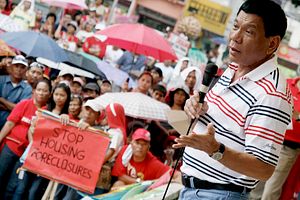Recent weeks have seen speculation regarding the specifics of Philippine President Rodrigo Duterte’s first visit abroad later this month.
Initial chatter centered on which other ASEAN capitals Duterte would hit, in addition to Vientiane where he was expected to attend the next round of ASEAN summitry. He is now set to also visit Brunei and Indonesia (See: “Duterte’s First ASEAN Tour: What’s On the Agenda?”).
But as I hinted in my previous piece, the focus has now moved to what the agenda for each leg of this ASEAN voyage will be. For the Indonesia leg, despite other key issues which officials expect to be discussed – from subregional economic cooperation to trilateral patrols in the Sulu Sea – media attention has unsurprisingly dwelled on how Duterte will address the death penalty.
Indonesia under Joko “Jokowi” Widodo has embarked on a series of controversial executions of foreign drug convicts on death row, and for the Philippines, the case of the Filipino woman Mary Jane Veloso in particular has been of interest.
On this question, Duterte would appear to be in a pickle. On the one hand, some in the Philippine media, as well as Veloso’s family, have been pressing him on whether he will say or do something about an issue that clearly affects the fate of a Philippine national, especially given the attention his administration has said it places on the fate of overseas Filipinos. Duterte’s reputation for truth-telling and bold actions, to put it politely, would also suggest that he will not leave that stone unturned.
But on the other hand, as I hinted at before, Duterte himself has embarked on his own controversial drug crackdown at home that has raised concerns about wrongdoing and rights. He is also pushing for a revival of the death penalty in the Philippines. That does not really seem to give him much room to give Jokowi an earful on this question.
That perhaps explains why Duterte has been coy about the issue in public. At a recent press conference, he said he would rather be private about such “sensitive” issues, demonstrating a level of caution he is not used to. And this week, he turned to religion (months after calling bishops in Asia’s largest Catholic nation “sons of whores”) saying he was praying he could do something for Veloso.
Duterte will probably end up addressing the issue in some manner, whether in public or in private or both, deliberately or inadvertently as he is prone to do in public engagements. His presidential spokesman Ernesto Abella even boldly suggested on Thursday that he could visit Veloso “given the opportunity.”
In any case, in spite of the hypocrisy that would be evident in any attempt by Duterte to give Jokowi an earful on this issue, consistency is an overrated virtue in international relations. The case in point is Indonesia itself, which has fought for the rights of its own citizens facing death row abroad – which number in the hundreds – but is killing foreigners at home.
































